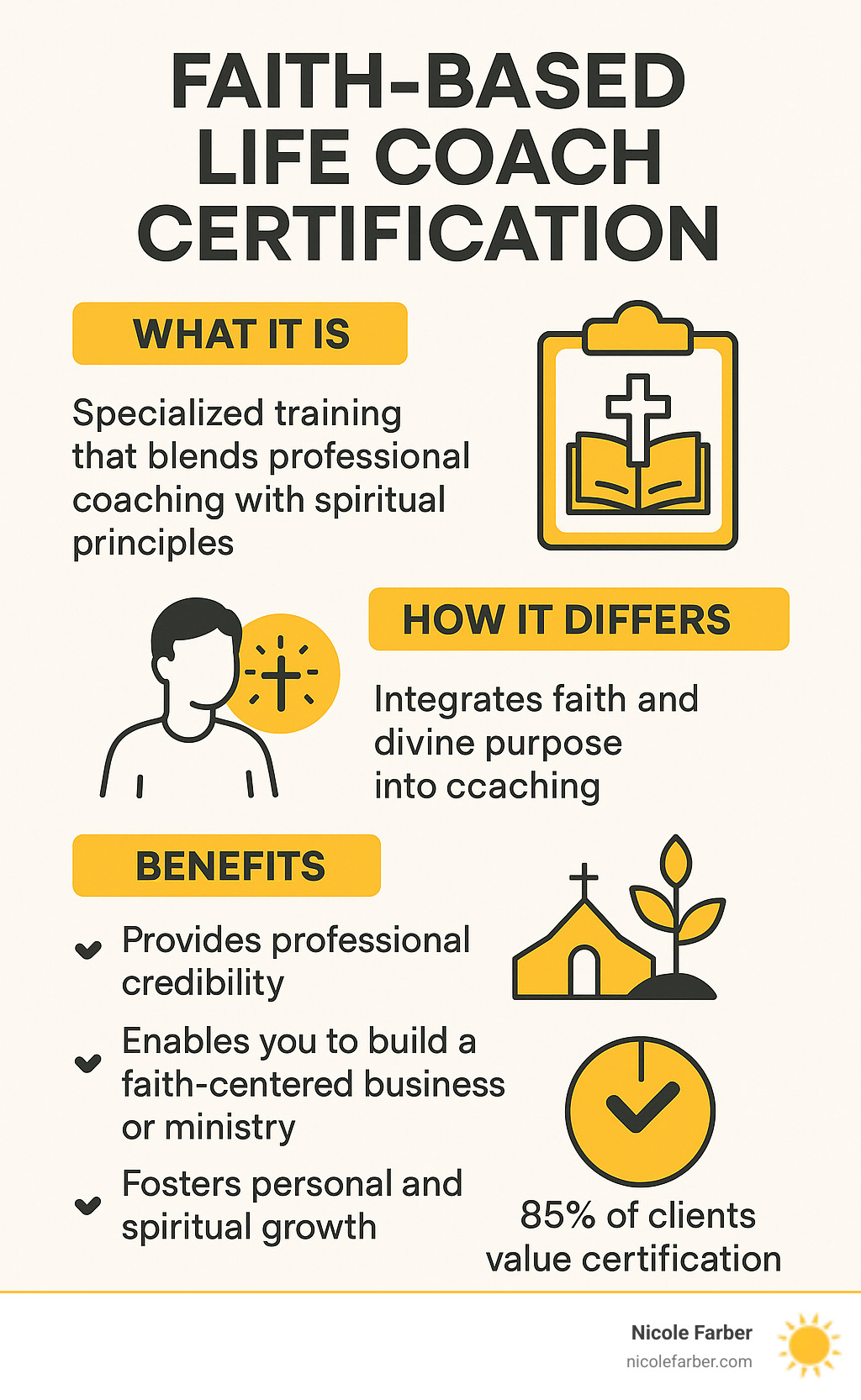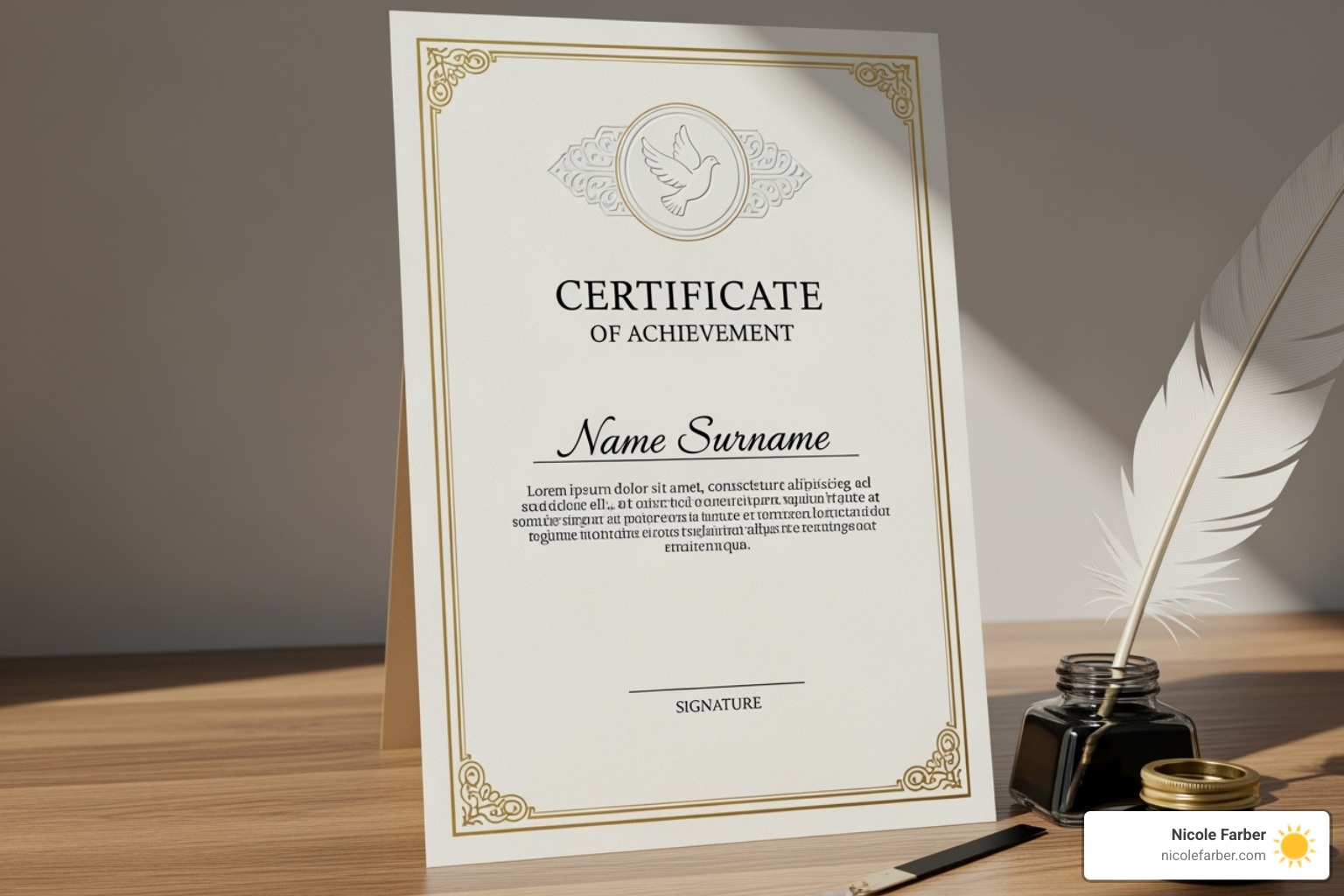From Calling to Coaching: Faith-Based Certification Pathways
- Faith
- In the News
- August 1, 2025
Your Journey to Faith-Based Life Coach Certification

A faith based life coach certification equips you to guide individuals using spiritual principles alongside proven coaching techniques.
- What it is: Specialized training that blends professional coaching with spiritual principles (e.g., biblical truths, Holy Spirit guidance).
- How it differs: Integrates faith and divine purpose into coaching, going beyond general life coaching.
- Benefits: Provides professional credibility, enables you to build a faith-centered business or ministry, and fosters personal/spiritual growth.
- Why it matters: According to the International Coach Federation, 85% of clients value certification, demonstrating your commitment and specialized expertise.
Has God called you to serve others? Do you feel a deep desire to guide people toward their best lives, guided by their spiritual convictions? For many, the answer lies in becoming a faith-based life coach.
This unique path allows you to blend your spiritual calling with professional skills. You can help others grow, overcome challenges, and find purpose, all while honoring your faith. It’s a way to make a real difference in the world.
This guide will explore how to earn your faith based life coach certification. We will cover what it is, its benefits, and how to choose the right program. You will also learn how to build a successful coaching business or ministry.
I’m Nicole Farber, and as the CEO of ENX2 Legal Marketing, I bring over 15 years of experience helping businesses grow and succeed. My passion extends to supporting others in their professional journeys, including those pursuing a faith based life coach certification to make a deeper impact.

Related content about faith based life coach certification:
What is Faith-Based Life Coaching?
At its core, faith-based life coaching is the art and practice of enabling individuals and groups to move from where they are to where God wants them to be. It’s about working from the “inside-out” to help people move forward in their lives, integrating their faith into every aspect of their journey. A Christian life coach, for instance, helps and encourages clients from a faith-based perspective through personal or professional challenges, integrating Biblical principles, Scripture, or prayer.
This approach is distinctly goal-oriented and future-focused. While traditional coaching helps clients achieve their goals, faith-based coaching adds a profound spiritual dimension. It helps clients set and reach goals aligned with God’s calling, helping them explore and improve their relationship with God, rely on Christ more fully, and integrate Christian principles into their everyday lives. It’s about helping clients open up the power of God in their lives, overcome barriers, and find God’s plan.
The foundation of our work in faith-based coaching is built on timeless biblical truths. We believe that integrating these principles into coaching provides a holistic approach to personal growth and change. It’s about helping individuals not just achieve their worldly aspirations, but also to deepen their relationship with God, enrich their faith walk, and grow personally and professionally in alignment with divine wisdom. It’s truly about helping others find their path and walk it with purpose, as we are called to Walk by Faith, Not by Sight.
The Benefits of a Faith-Driven Approach
Choosing a faith-driven approach to life coaching offers a multitude of benefits, both for us as coaches and for the clients we serve. It’s an opportunity to answer a higher calling and use our gifts to serve God by supporting, encouraging, and inspiring others.
For us, it means:
- Purpose-Driven Career: It’s more than a job; it’s a ministry. You can build a rewarding career or business that aligns with Christian principles and makes a real impact.
- Deeper Client Connection: Integrating faith allows you to connect with clients on a spiritual level, helping them find God’s plan, reduce stress, and grow in confidence.
- Personal Faith Enrichment: Guiding others often deepens your own faith and relationship with God, fostering both personal and professional growth.
- Community Building: You’ll join a supportive network of like-minded Christian coaches, providing encouragement and accountability.
A faith-driven approach transforms coaching into a powerful tool for personal change and spiritual growth, aligning with our calling for Leadership in all areas of life.
Coaching vs. Christian Counseling: Understanding the Difference
It’s crucial to understand the distinction between faith-based life coaching and Christian counseling or therapy. While both aim to help individuals, their focus, scope, and methodologies differ significantly. Coaching is not counseling, and coaches do not diagnose or treat mental health disorders.
Here’s a clear comparison:
| Feature | Faith-Based Life Coaching | Christian Counseling/Therapy |
|---|---|---|
| Focus | Future-oriented, goal-driven. | Past-oriented, healing-focused. |
| Goal | Empowering clients to achieve goals aligned with their faith. | Treating mental health conditions and resolving past trauma. |
| Approach | Proactive, action-oriented, and strategic. | Diagnostic and therapeutic, using clinical methods. |
| Regulation | Unregulated industry; certification is voluntary. | Licensed and regulated profession with specific legal requirements. |
Your Pathway to a Faith Based Life Coach Certification

Many people are looking for guidance to steer their lives. They face personal, professional, and spiritual challenges, and skilled life coaches are in high demand. We’ve seen a clear sign of this need: a strong 85% of clients who are looking for a coach say it’s important or very important that their coach holds a certification or credential. This powerful statistic really shows why a faith based life coach certification is so valuable.
While coaching isn’t a regulated field, getting a voluntary certification gives you a huge head start and immediate respect. A professional credential tells people that you meet specific faith-based standards and requirements. It shows you’re dedicated to doing things ethically and that you truly understand what it takes to be a great coach. It’s not just about learning skills; it’s about building trust with clients and showing you follow high professional standards.
More than just professional recognition, earning your certification is a powerful step in growing your ministry. It prepares you to launch a thriving coaching business or ministry. This way, you can truly make a difference for God’s Kingdom and serve Him well.
Finding the Right Accreditation and Credentialing
Choosing the right faith based life coach certification program means understanding how accreditation and credentialing work. Why does accreditation matter so much? Because it’s like a stamp of approval. It tells you that a program meets certain quality standards, giving you peace of mind that your training is thorough and respected.
The International Coach Federation (ICF) is widely seen as the gold standard in the coaching world. Many excellent faith-based programs are ICF-accredited, meaning they follow global coaching best practices while weaving in faith principles.
Beyond general accreditation, there are also Christian-specific organizations that offer important credentials. These bodies ensure that a program meets specific faith-based standards and that coaches are equipped to integrate biblical principles into their practice ethically and effectively.
These accreditations and credentialing bodies are important because they ensure programs are recognized, uphold ethical standards, and ultimately make your practice more trustworthy. They prove you’ve met strict education and experience requirements, preparing you to guide others toward the life God has called them to live.
What to Expect from a faith based life coach certification Curriculum
A quality faith based life coach certification curriculum will equip you with both core coaching skills and the unique ability to integrate faith into your practice. While programs vary, you can expect to learn:
- Foundational Coaching Skills: Master active listening, powerful questioning, goal setting, and strategies for building client trust and resilience.
- Biblical Integration: Learn to weave your faith into coaching by applying biblical principles, Scripture, and prayer. Many programs emphasize Spirit-led coaching, helping you guide clients with divine wisdom.
- Niche Specializations: You can often focus on areas like marriage, career, leadership, or life recovery coaching.
- Business Building and Ethics: Gain practical knowledge on ethical guidelines, marketing your practice, and building a sustainable business or ministry.
The curriculum is typically hands-on, with real-world practice to ensure you become a knowledgeable and effective coach, ready to embody the principles of How to Become an Effective Leader in your work.
The Investment: Cost and Duration of a faith based life coach certification
Starting your journey to get a faith based life coach certification means investing both time and money. But when you consider the personal growth, spiritual fulfillment, and the chance to launch a meaningful business or ministry, this investment can pay off in immeasurable ways.
The cost of certification programs can vary widely, from a few hundred dollars to several thousand, depending on the depth of the curriculum and the level of accreditation. Generally, faith-based programs can be more affordable than their secular counterparts, which can sometimes cost upwards of $20,000 for advanced certifications.
The time commitment also differs. Some programs can be completed in a few months, while more comprehensive, advanced credentials may take a year or more. Many programs offer flexible learning options, including self-paced online modules and live virtual classes, allowing you to study in a way that fits your life.
Thankfully, there are also free or low-cost options available, making certification accessible regardless of your financial situation. Some organizations offer high-quality training at little to no cost, and many programs provide scholarships or payment plans. This commitment to accessibility ensures that anyone with a calling to coach can pursue it.
The investment you make in a faith based life coach certification is an investment in your calling, your professional future, and your ability to make a deep spiritual impact.
Building Your Successful Coaching Business or Ministry

The moment you receive your faith based life coach certification, an exciting new chapter begins. You’re no longer just someone with a dream to help others – you’re equipped with real skills and a spiritual foundation to make a genuine difference in people’s lives.
Building your coaching practice starts with understanding who you’re called to serve. Your faith-based training gives you a unique advantage because you can specialize in areas that matter deeply to Christian clients. Maybe you’re drawn to helping couples strengthen their marriages through biblical principles, or perhaps you feel called to guide professionals who want to align their careers with God’s purpose.
Client acquisition becomes much more natural when you know your niche. Instead of trying to help everyone, you become the go-to expert for specific challenges within the Christian community. This focused approach allows you to speak directly to the hearts of those who need exactly what you offer.
Creating your brand isn’t about fancy marketing tricks – it’s about authentically communicating the spiritual change you provide. Your website becomes your digital ministry space, showcasing not just your services but the heart behind them. Social media platforms become tools for sharing encouragement, biblical wisdom, and glimpses into how faith-driven coaching really works.
The beauty of faith-based coaching lies in the natural networking opportunities within Christian communities. Churches and ministries often encounter people who could benefit from coaching, and your specialized skills complement pastoral care beautifully. Offering workshops at local churches or partnering with ministry leaders creates genuine connections that grow organically.
As someone who’s built a business while navigating the challenges of single motherhood, I understand how overwhelming it can feel to start something new. But when your business flows from who you are and what God has called you to do, it becomes less about selling and more about serving. Whether you’re interested in Business Coaching for Lawyers or passionate about Women Entrepreneur Coaching, the principles remain the same: authentic branding, strategic growth, and unwavering purpose.
Your faith based life coach certification isn’t just a credential – it’s your foundation for building a thriving practice that honors God while changing lives.
Post-Certification Support and Resources
Getting certified is just the beginning. Ongoing support is crucial for your growth and success as a faith-based coach.
- Continuing Education: Stay current and deepen your skills with ongoing training. Most credentialing bodies require continuing education, which helps you integrate biblical principles in new ways.
- Coaching Community: Connect with other Christian coaches who understand your journey. These networks provide invaluable encouragement, friendship, and professional partnerships.
- Mentorship: Personalized guidance from an experienced coach can help you refine your approach and build confidence, especially in the early stages of your practice.
- Professional Associations: Joining an association can offer credibility, networking opportunities, and access to exclusive resources that support your professional development.
- Business Tools: Many programs provide practical resources like coaching agreements and client intake forms, helping you focus on what you do best—coaching.
This support system ensures you’re never alone on your path, empowering you to accept the full journey of Life as a faith-based coach.
Frequently Asked Questions about Faith-Based Coaching
Is certification legally required to be a faith-based coach?
It’s a great question, and the simple answer is no, not legally. Coaching, unlike professions such as therapy or counseling, is largely unregulated. This means there isn’t a universal law that says you must have a faith based life coach certification to start helping people.
However, while you might not legally need it, getting certified offers a huge head start! Think of it like this: you could teach yourself to bake a cake, but a pastry chef certification shows you’ve mastered the craft. For faith-based coaches, a certification proves that you meet certain standards and ethical guidelines. It builds trust and shows you’re serious about your calling.
Just remember, coaching is about guidance and personal development, often rooted in ministry. It’s different from licensed counseling or therapy, which are regulated by state laws and deal with clinical treatment. We’re here to help people grow, not diagnose or treat medical conditions.
How do I choose the best certification program for me?
Picking the right faith based life coach certification program can feel like a big decision, but it’s all about finding the perfect fit for your unique calling and dreams. Here are some friendly pointers to help you steer:
First, always look for Accreditation and Recognition. This is like a seal of approval! Programs accredited by well-known bodies or recognized by respected Christian coaching groups show that they meet high-quality standards. This recognition helps build trust with your future clients.
Next, dive deep into the Curriculum and Faith Integration. Does the program teach you solid coaching skills like truly active listening and asking powerful questions? More importantly, how well do they weave biblical principles into the coaching process? Do they offer specializations that excite you, like coaching for marriage, career, or spiritual growth? Make sure it aligns with your passion.
Consider the Cost and Duration. Programs can vary a lot in price and how long they take to complete. Some are quick and intense, while others spread out over months or even years. Think about your schedule and budget. Are you looking for a self-paced option or do you thrive in a live group setting? And don’t forget to check for free or low-cost options and even scholarship opportunities – they’re out there!
Also, look into the Instructor Credentials and Support. Who will be teaching you? What’s their experience? A great program won’t just teach you skills; it will also offer support after you graduate. Look for things like coaching communities, mentorship programs, or resources to help you build your business. Hearing from past graduates can give you real insights into what the program is truly like.
Finally, think about the Unique Focus of the program. Some might emphasize Spirit-led coaching, while others focus more on business building. Choose the one that truly resonates with your vision for your coaching practice or ministry. This journey is yours, so pick a path that feels right for you!
Can I coach people who are not of my faith?
Yes, absolutely! This is one of the beautiful things about coaching. While we operate from a Christian worldview and integrate biblical principles into our coaching, it doesn’t mean our clients have to share our faith.
Our role as faith-based coaches is to serve people right where they are. We’re there to help them achieve their goals and open up their potential, no matter their background. We bring our faith, our values, and our wisdom to the coaching relationship, but the client always leads the way in setting their own goals and agenda.
The true beauty of coaching is that it’s all about the client. We meet people with respect and understanding, and we partner with them to help them reach their desired outcomes. Our faith certainly informs our approach and empowers us to guide others with love and wisdom, but it’s never about imposing our beliefs. It’s about empowering, encouraging, and guiding everyone who seeks our support.
Conclusion
What an incredible journey we’ve explored together! From that first stirring of a divine calling to the clear path of becoming a certified faith based life coach certification, it’s truly rewarding. This isn’t just a career; it’s a way to weave your deepest beliefs into powerful professional work. You get to change lives and make a real impact on God’s Kingdom.
We’ve talked about what makes faith-based coaching so special. We’ve seen the amazing benefits it brings, both for you and for the people you’ll serve. And we’ve laid out the clear steps to get your certification.
A faith based life coach certification is so much more than just a piece of paper. It shows your dedication to high standards and ethical practice. It proves your commitment to a Christ-centered way of helping others. It gives you the skills to guide people toward God’s plan for their lives. You’ll help them steer tough challenges, find their purpose, and grow stronger in their faith.
My own journey as a single mom and CEO in legal marketing has taught me a lot. It’s been driven by faith and a deep desire to help others succeed. My experience shows that real success, whether in business or ministry, comes from real-life lessons, a strong purpose, and leadership guided by faith. It’s not just about building a business; it’s about building a lasting legacy of positive change.
If you feel that quiet stirring in your heart, this guide is your invitation. The world truly needs more Christian coaches. It needs people like you, ready to bring hope, clear guidance, and spiritual wisdom to those searching for direction. So, accept your calling. Invest in your training. Get ready to start on a fulfilling journey where your faith and your profession beautifully come together. We encourage you to Explore your path in Faith and find the incredible difference you are meant to make.
